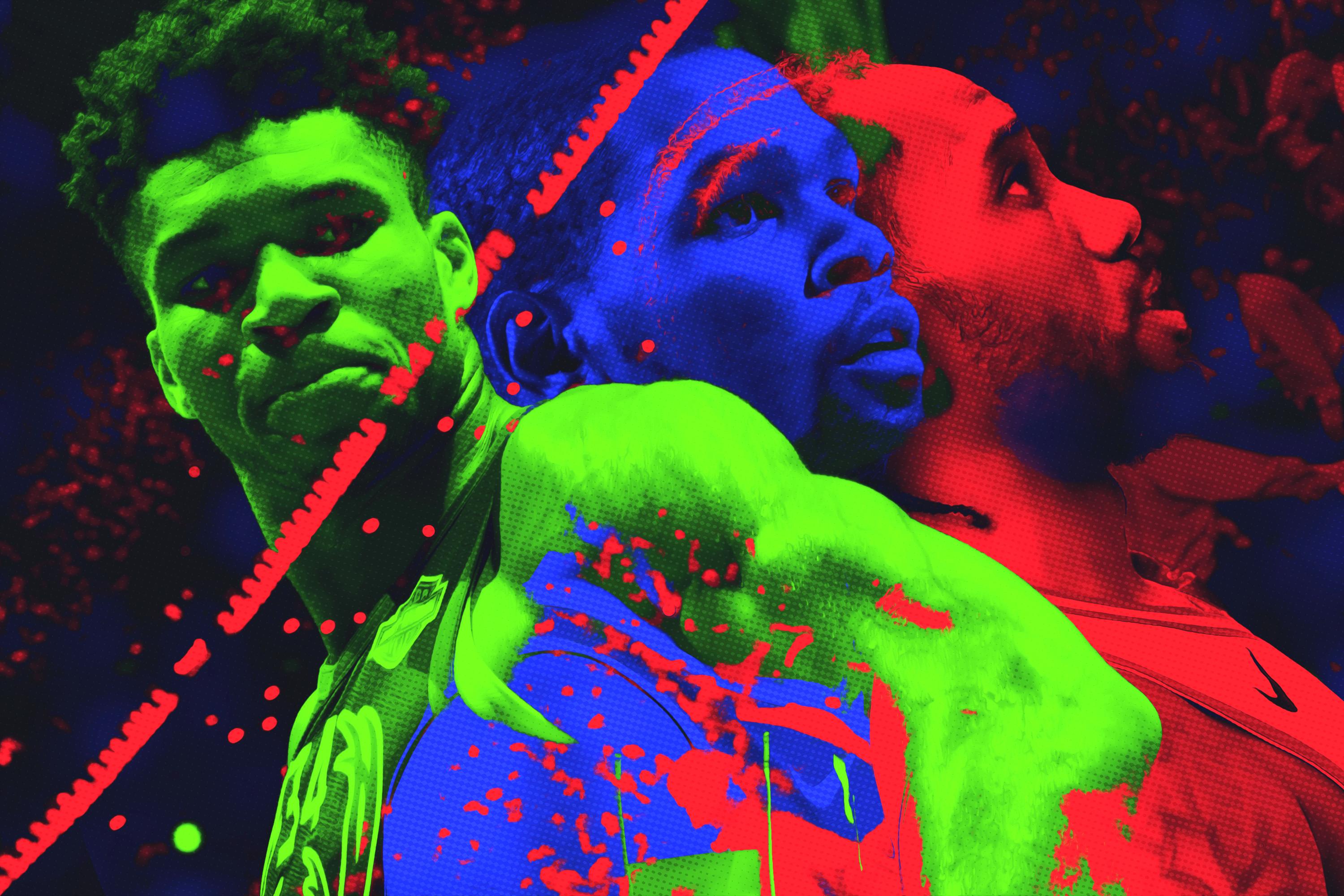A Rational Conversation About What Happens When NBA Titles Are Not Enough
The NBA Finals aren’t just the end of the season, they seem like the end of a league era. In about a month’s time, one of the more consequential free-agent classes in history—headlined by NBA finalists Kevin Durant and Kawhi Leonard—will hit the market, and the complexion of the league will likely change.
Chris Ryan: We are about to kick off the 2019 NBA Finals, but I find myself pretty consumed with what will happen during 2019 NBA free agency. The two are related. There’s a good chance that no matter which team wins the Larry O’Brien paperweight, both participants could see their best player leave this summer. Kevin Durant could bounce from Golden State, and Kawhi Leonard might not renew his lease in Canada.
What does it mean if the NBA Finals are not enough? Maybe this is a matter of the only two players capable of making whatever team they join NBA finalists. Leonard has just proved how quickly he can turn around a franchise’s fortunes, and a healthy Durant would probably have the same if not greater impact on whatever team he inks with.
I’m not particularly scandalized by the notion of walking away from a winning situation for parts unknown, but it seems different than when Durant left Oklahoma City to get closer to a championship, or when LeBron James left Cleveland for the second time. The reasoning behind a possible Leonard departure would presumably be that he doesn’t like the cold? He never chose Toronto; Toronto chose him? For Durant, it’s even harder to parse. Maybe it’s time to prove he can do it on his own. Maybe he is tired of hearing that he ruined basketball and the Warriors will always be Steph’s team. Either way, neither player will leave for money, and neither will leave to have a better shot at winning. It seems like we’re entering a new era. The Age of Inscrutability?
Justin Verrier: Or maybe we’re resetting to a time before Michael Jordan became the archetype. Titles always mattered—it is, y’know, the point of the game. But Jordan’s single-mindedness, and all of the stories trumpeting Jordan’s single-mindedness, bred a sort of rings masochism, best represented by Kobe Bryant. Even as LeBron James established a new paradigm by teaming up with two other max players in Miami, his decision was being made in service of the same goal: to win as many championships as possible. Not one, not two, not three …
But think of how that mind-set is received today. Jordan is a crying disembodied head. Slap an extra s or two on “rings” and the word warps into a term of derision. “LeBron is post-titles” is a real thing that real people say. Maybe it’s the product of something as far-reaching as a shift in culture, but at the very least, the public pressure to stack championships no longer seems all-consuming. As a result, players are beginning to weigh other priorities more heavily. You still play to win the game, but it’d be nice to also play in a cosmopolitan city with all your friends.
If Durant were to join a blank slate in New York to be near his businesses, or whatever motivations he would have for choosing to work for Jim Dolan, it would seem closer to when Shaq left the Magic, fresh off a second straight Eastern Conference finals appearance, for the Lakers, fresh off a loss in the first round, in no small part because of his interests in Hollywood and interest in extending his endorsement reach. Isn’t that closer to how things work in soccer, too?
Ryan: Yeah, so, the soccer thing. This is in the air a bit, with Marc Stein’s interview with Adam Silver about possibly introducing a League Cup to the NBA. Your comparison to Shaq is on the money, but I wonder whether someone like Neymar would be more accurate. Neymar is from Brazil, is one of the four or five best players in the world, and, during his time at Barcelona, was part of maybe the greatest attacking trio in the history of the game, playing alongside Lionel Messi and Luis Suárez. In 2015, Barcelona won the treble (league, league cup, Champions League). In 2016, they won a domestic double. In 2017, Neymar helped orchestrate the biggest comeback in Champions League history against Paris Saint-Germain, and then in August of that year, he pulled what I guess you could call a Reverse Durant, and joined them.
Why? Money? Sure. PSG pay him almost €1 million a week. Maybe he wanted out from under Messi’s shadow. There were lots of reasons, but really the big one was that he had come to the end of his cycle at Barcelona. You hear that word a lot in European football: cycle. A player or manager stays somewhere for a few seasons, then it’s time to move on. It’s hard to get concrete information about why anyone does anything in European football, but in the end, because there is such a multiplicity of experiences available for the talent—at different clubs, in different countries, playing in different leagues, competing for varying numbers of trophies, with assorted levels of pressure—you wind up seeing movement for movement’s sake. It’s not weird to see Cristiano Ronaldo leave habitual Champions League winners Real Madrid, or Paul Pogba leave serial Serie A winners Juventus, or Neymar probably leave PSG in the coming summer or next year … for Real Madrid! The circle of life! Changing teams happens for lots of reasons, but it happens mostly because players see their careers in chapters rather than as one long story.
We are still hanging on to an old-school idea of team sports here. I think when this era of player movement first dawned, in the wake of The Decision, we, as NBA watchers, were trying to wrap our heads around why someone would deviate from the obvious narrative laid out before them. It’s his … hometown team! And they’ve never won! And he’s so close! LeBron broke a bit of that, but then he glued it back together by going home.
That wishful thinking extended beyond LeBron in the mid-2010s, with people looking for fairy tales in gossip columns. That’s how you get “KD2DC.” In the past, say, 18 months, we’ve been operating under the assumption that players were just looking for the right basketball situation—à la Kyrie in Boston or Durant in Golden State—and that money was almost secondary to happiness. But this summer seems different—the paradigm shift you’re talking about. Maybe happiness is what matters, but maybe that happiness is more complicated than our usual sports media discourse can handle? Kawhi Leonard seems especially pertinent here.
Verrier: Kawhi’s situation is particularly interesting in contrast with Durant’s. KD carefully manufactured his exit from Oklahoma City, following the blueprint LeBron drew up in 2014 to pave a way back to Cleveland. He disseminated the heartfelt, totally-not-ghostwritten letter to announce his choice. He shrouded his decision in the pursuit of some higher goal (in LeBron’s case, winning the Big One for his hometown; in Durant’s case, reaching basketball nirvana through sacrificing touches in the Warriors’s ball-moving offense). He was instantly hated for it, but he had to expect some immediate backlash. The difference is he’s still hated for it. The hate has gotten worse with each passing year. Winning, it turns out, has not solved everything. In fact, it’s the primary source of fans’ frustration—that the Warriors are too good for anything else in the league to matter. Durant wins so much that he cannot win in the court of public opinion. So while it’s hard to pin down what, exactly, is pushing him toward New York, you can at least understand why he may want something different from the best winning situation in history.
Leonard, on the other hand, is a mercenary. He never chose Toronto, and it has been widely assumed for months that he will leave for the West Coast as soon as he’s able to. The day he lifted the Raptors into the NBA Finals, a video taken by his sister circulated because someone nearby her insinuated Leonard was gone no matter what: “They know darn well he ain’t gonna be there next year.” And yet, Leonard’s approval rating has never been higher. Maybe the cold terms of his relationship with the Raptors provide a certain clarity—that this is a business partnership, not some journey for fulfillment, with a clear beginning and a clear end? Masai Ujiri procured Leonard’s services to complete a task, and Leonard is executing his job—really, really, really well. Leonard has exceeded expectations, and, by doing so, has satisfied one of the most tortured fan bases in the league. What can Durant accomplish to bring about that level of satisfaction? He hasn’t lost a playoff series in three years, and yet the Warriors have never seemed happier than in this two-week stretch playing without him.
The interesting question heading into this year’s Finals, I think, is how much impending free agency affects the entertainment value of the games. Are you less interested in the outcomes knowing that Durant and Leonard—and Klay Thompson and Marc Gasol and the layup god Kevon Looney—could all be playing for some other team in a few months?
Ryan: They seem like a necessary step to get to wherever we’re going next. I think there’s a collective desire for the Durant Era of Warriors Dominance to wrap up (with all due respect to Golden State fans who feel like they died and went to heaven, everyone else has had to watch them do it while they all stay down here on a dying planet).
I wonder whether more players might try to follow Kawhi’s and Masai’s lead going forward. The less you make it an emotional negotiation, the more favorable the outcome is in your favor. Maybe Anthony Davis should have Uncle Dennis handle his New Orleans exit strategy. As Kawhi’s shown, what’s the worst that can happen? You get booed? Some guy calls you disloyal on TV? If the Raptors had lost in the second round to the Sixers, wouldn’t his value be just as high this summer? He’s also going to have a profound impact on the way teams will be built. If I’m a GM of a Toronto-level team—Utah, Portland, insert a secondary market that’s not a typical free-agency destination—I am making my version of the Godfather offer to David Griffin for Anthony Davis. This is the power of the one-year rental. It can work.
Verrier: Davis did everything wrong for multiple months, and no one outside of New Orleans will care once he’s catching lobs from Spencer Dinwiddie.
Ryan: Let’s think wider lens than the Finals, though. If we do live in an NBA era when nobody ever seems happy for more than a few months at a time, what impact does that have on the product on the floor and the fans’ relationship to the game? Can we not process Giannis’s losing one Eastern Conference finals without melting down into a pool of will-he-bolt speculation? Does the elite-player quest for some kind of unreachable satisfaction trickle down to our relationship to the league itself?
Verrier: Giannis himself already seems fatigued by it. ESPN dropped a story about the MVP front-runner’s uncertain future in Milwaukee minutes after the Bucks’ Game 6 loss to the Toronto Raptors. After being asked a benign question about experience (?) by the author of the story in postgame interviews, Giannis stormed off the dais, much to the befuddlement of everyone, but especially Khris Middleton:
I feel for Giannis, whether his reaction was a result of the story or not. He and the Bucks smashed preseason expectations, earning the league’s best record and him a spot on the MVP ballot along the way, yet a loss in May 2019 is instantly warped into a footnote for his decision in July 2021. Everything moves too damn fast. But the accelerated timeline is as much a product of his peers’ decisions as it is today’s media culture. Davis can’t become a free agent until July 2020, yet he orchestrated his exit strategy in January 2019; Irving asked out of Cleveland two years before he could enter free agency; and so on. It’s in teams’ best interest to get some sort of payout for their damages, so the process of trading a disgruntled star starts way earlier than you’d think. Next season is the Bucks’ proving grounds, whether they want to admit it or not, and they’re heading into an offseason when almost every helpful player is a free agent. There is a good chance that Milwaukee’s window has closed, just days after we coronated them as the NBA’s next dynasty.
Ryan: Yeah, it’s a question most teams will have to take really seriously: What do you have to do to keep your best players engaged with your project? And what happens if your best isn’t good enough? Or fast enough?
Verrier: It’s no wonder the league has become so star-driven—it’s the only control variable from season to season.

